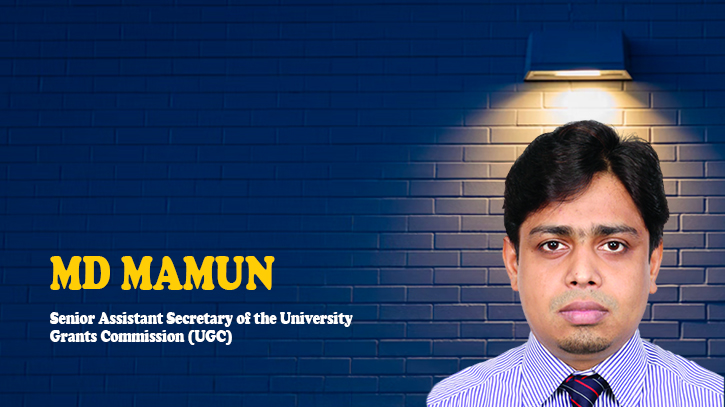
Photo : Messenger
Bangladesh has achieved appreciable progress in various fields in the recent past years. But one area still requires significant attention. That is the education system. Education is the main foundation of development of any nation. It is essential to address the major issues in the education system for Bangladesh.
This is the age of globalization and Bangladesh is not beyond the ambit of it. The world is forwarding fast and Bangladesh is trying to keep pace in this race of development. In 2026, it is going to graduate form Least Development Countries (LDC) status. But how much are we prepared to cope with the upcoming challenging situations of the 21st century? Undoubtedly, it is true to say that a country climbs up to the optimum of success by dint of the tireless contribution of the educated people along with the uncompromising efforts of the common mass. Now the question arises indicating the higher education curricula in our Bangladeshi universities.
If we keep our surveillance with an open eye, it is very much lucent that a many foreigners are doing jobs in the most highly paid positions in the different working sectors of Bangladesh. Our industries, factories and institutions are bound to hire those skilled foreigners with a high salary due to the lack of having no skilled personnel domestically. The skilled foreign people occupy the top-most position of our institutions or industries, on the other hand, our educated youths who have completed their university education don’t get job or simply don’t qualify in the competition of the job market. “What have they learned from the university curricula?” this question crisscrosses in our minds.
Recently, the Honorable Finance Minister has stated in the parliament that during the last 10 months (July-April) of the fiscal year 2023-2024, only the Indian working in Bangladesh have sent 50.60 million USD to their respective country. Besides, there are Nepalese, Sri Lankan, Russian, African, Japanese, Korean and other countries nationals working in the different sectors of Bangladesh. Alas! If we would be able to flow our money inside not surpassing the boundary of Bangladesh!
An estimation shows that the unemployment rate among the university graduates in Bangladesh is near about 39.6 percent which indicates the skill mismatch of our graduates studying in the university’s curricula. The graduates are, with a hard soul, trying to secure a job but our traditional education system lacks skill orientations in line with the industry demands of the job market.
The question comes and crosses what the reasons are contributing behind these situations. The straight answers may be like that the foreigners are highly skilled and hardworking and so they are eligible to hold the topnotch positions in the labor market or industry in Bangladesh. But it is clearly stated with a bold line that causes of it is deeply rooted in the curricula of education most importantly in the higher education curricula.
So, it is now the turn to identify the backwardness of the tertiary level curriculum and the following reasons are: (i) absence of research based curriculum (ii) lack of modification of the outdated university curriculum (iii) not having the linkages between the industry and academia in the curriculum (iv) not having multi and inter-disciplinary curriculum (v) limited practical applications in the curriculum (vi) non-alignment of the curriculum with the job market and industry (vii) lack of entrepreneurship courses in the multidisciplinary fields (viii) lack of practical skill based curriculum (ix) absence of the internationalization of the curriculum (x) not updating the tertiary curriculum with the pace of the international market demand (xi) lack of soft skill’s application in the higher education curriculum (xii) concealing of technology backed curriculum (xiii) lack of international issues engagement in the curriculum (xiv) absence of prioritizing the higher education cognitive skills and transformative learning (xv) lack of professional ethics or moralities, understanding of self-awareness issues in the curriculum.
To meet up the world demands and to face the upcoming challenges of the changing world, the higher education curricula should be modified by focusing on: industry needs, soft skills, research based learning infrastructure, interdisciplinary and multidisciplinary programs, internationalization, focusing on languages, practical application based curriculum, interactive and exclusive course, fostering a culture of innovation and exploration of new things and ideas. The another important issue needs to be addressed that the training of the university teachers is a must to have a successful and most updated curricula in the diverse fields. Besides, the concerned authority, specially the University Grants Commission (UGC) of Bangladesh, may invite a pragmatic curricula proposal from the educationists that flies with time.
These are some ways Bangladesh's higher education curriculum which can be adapted to address the challenges of the present world and prepare graduates to thrive in the job market and contribute meaningfully to society as well as country. It requires a collaborative effort from the government, universities and the private sector.
Bangladesh government has already adopted a new skill based curriculum for secondary and higher secondary levels in the year of 2023 signifying to face up the challenges of the 21st century globally. So, with this trait, the higher education curricula must be updated and reformed by keeping pace with the demands of the present changing world.
The writer works as a Senior Assistant Secretary of the University Grants Commission (UGC) of Bangladesh. He can be reached through this Email: [email protected]
Messenger/Fameema








